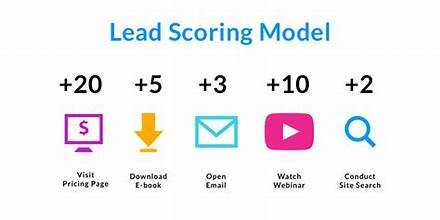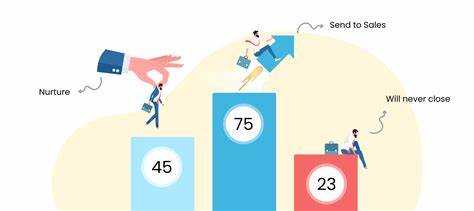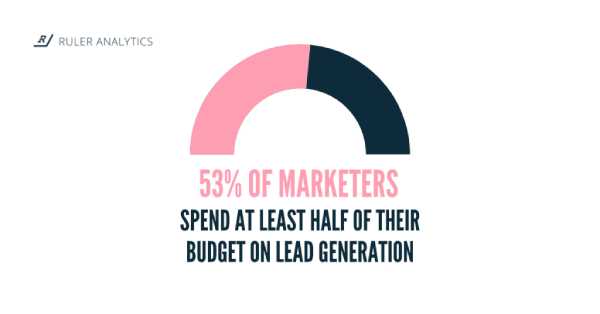
In this fast-based B2B world, competition is as cutthroat as possible. Too many businesses target the same audience, each trying to win their hearts and cash in the money. So, what leads you to security and not obscurity?
Your ability to identify, prioritize, and engage with the right prospects. Enter lead scoring, a business strategy that has changed the way companies meet with possible customers.
It is the number one way to prioritize your leads. Additionally, it can improve your conversation rates by 50%, especially when 70% of B2B leads are not yet ready to buy. And if these statistics haven’t moved you yet, here’s another one: Using B2B lead scoring results in a 77% higher ROI for lead generation than not using it.
For This Reason Alone, Today, We Will Explore The Value Of Lead Scoring Layer By Layer For You!
Let’s Begin!
Quick Recap: What’s Lead Scoring?
Imagine that your funnel is full of leads. Some may really want your product or service, while others may just be looking around. Lead scores tell you the difference between the two so you can put your resources where they will do the most good.
Simply put, lead scoring is the art of assigning numerical values to your leads based on various factors. It lets you determine how interested they might be and how likely they are to buy from you.
Think of it as a system that sorts your leads into groups, from “ice cold” to “red hot,” so you know how to market and sell to them.
Simplifying The Lead Scoring Process
When sorting through potential customers in marketing, lead scoring is the name of the game. It’s like giving leads a score out of 100 to see if they’re a good fit. Here’s how it works:
1. Determining Threshold
The process starts by deciding the minimum score a lead has to score to become a Marketing Qualified Lead (MQL). The marketing team carries out this activity.
2. Choosing Scoring Factors
Next, you identify your scoring factors. These include two things. One, demographic details inspired by your ideal customer profile, like company size, job title, etc. And two, behaviors like engagement with content, web visits, content downloads, and more.
3. Assigning Scores
Once the factors are identified, you start by scoring each lead by assigning positive or negative values. The highest point value is assigned to behaviors or characteristics with a strong propensity to close.

4. Tracking Leads
In this step, a spreadsheet or software is used to keep track of these scores. Once they are scored, the data is shared with the sales team for lead nurturing [now, this is another nut to crack].
Over time, leads can earn more or fewer points based on their actions, pushing them closer to or further from becoming a “Marketing Qualified Lead” (MQL). Sales then fine-tune them into “Sales Accepted” or “Sales Qualified Leads” while tossing aside the less promising ones. If too many bad leads make it to sales, you adjust the scoring.
In a nutshell, lead scoring saves time by helping sales focus on the best leads and keeps us on track from generating leads to converting them. Now, let’s dive into why lead scoring is so valuable.

Importance of Lead Scoring
1. Increase Conversions
By prioritizing high-scoring leads, you’re allocating your resources wisely. You’re not just casting a wide net but focusing your efforts on those most likely to convert.
The result? 20% better chances to close the deal, leading to higher conversion rates. This translates to a better return on investment (ROI) for your marketing efforts. When you put so much time, effort, and money into generating leads, vetting them carefully for strategic conversions only makes sense.

2. Aligns Marketing and Sales
The mismatch of the sales and marketing departments is a long-standing issue in B2B organizations. Lead scoring overcomes this mismatch by creating common ground. Working with the same scoring system encourages teamwork and facilitates communication between the two teams. Moreover, it helps to keep miscommunication and confusion at bay!
3. Helps Avoid Scaring Away Leads
Not all leads are equal. While some leads require longer nurturance, some decide to buy your product right away. Lead scores inform salespeople when a potential customer has taken the steps that indicate they are ready to talk. They can then strike the right conversation at the right time with the right resources.

4. Saves Time and Effort
You avoid wasting time speaking with, presenting to, or thinking about leads that have a poor likelihood of converting. When you successfully qualify marketing leads, you have more time to nurture them into a sale. You will be surprised to know that lead scoring models reduce deal closing time by 50%!
5. Tailor Inbound Marketing Strategy
Lead scoring not only tells you who is most likely to buy but also where that lead comes from. As such, you can identify which lead generation tactics have worked the most for you. Consequently, you can focus more on these tactics and attract high-quality leads.

6. Adjust Sales Efforts
The lead’s score reflects how likely they will become a client. This enables you to create an effective plan to meet your sales objectives by allowing you to produce more precise short- and long-term revenue estimates.
Wrapping Up
Lead scoring is a powerful tool, and when you use it well, you’re not simply keeping score; you’re conducting a growing symphony. The benefits are apparent whether you want to increase your conversion rate through the roof or just get a deeper knowledge of your prospects.
It’s time to lead the way, score big, and conquer the realm of B2B like the true champions you are. And if you need any assistance, Impulse Digital is here for you!
We are a team of creative minds who lead the way with data-backed approaches. Our digital experience and knack for staying ahead of the curve make us just the right digital marketing partner for you. What do you think?


